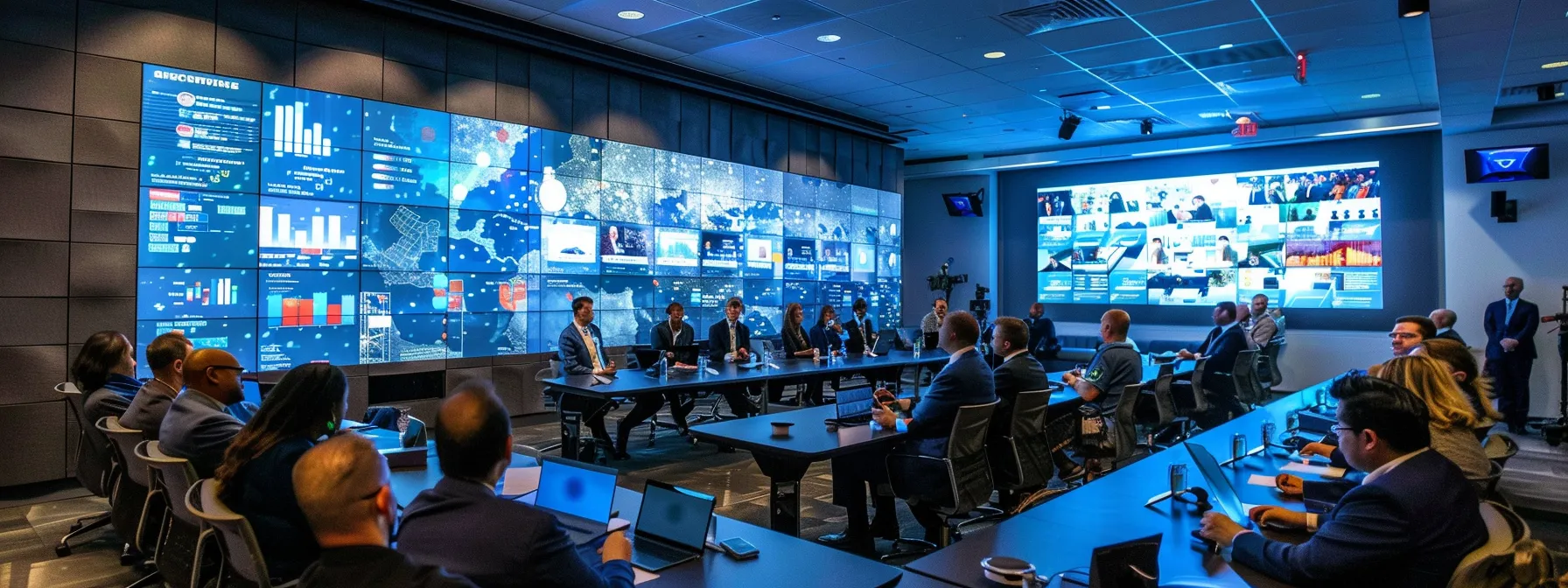
Understanding CMMC Consultant Costs: What You Need to Budget for Compliance
Navigating the costs of hiring a CMMC consultant can be challenging for businesses seeking compliance. Many companies underestimate their budget for these essential services, potentially leading to unexpected expenses. This article will explore the key factors influencing CMMC consultant investment, common services included in pricing, and various fee models. Readers will gain clarity on budgeting for CMMC consulting and learn how to identify hidden costs, ensuring they make informed decisions while achieving compliance without overspending. By understanding these elements, businesses can effectively allocate resources and protect themselves against financial surprises.
Key Factors Determining Your CMMC Consultant Investment

Investment in a cmmc consultant significantly hinges on several key factors. Organizations should first assess their current cybersecurity posture and identify the required CMMC certification level. Understanding the scope of consulting services, evaluating consultant experience, and considering the company’s size and complexity are also essential. These elements will guide budget considerations while addressing threats like social engineering and compliance with international traffic in arms regulations, ultimately ensuring a robust supply chain security posture.
Assessing Your Organization‘s Current Cybersecurity Posture
To effectively evaluate an organization‘s cybersecurity posture, it is essential to conduct a comprehensive risk assessment. This assessment should focus on the handling of controlled unclassified information (CUI) and be led by a chief information security officer (CISO) or a qualified consultant. By examining physical security measures, existing policies, and compliance frameworks such as FedRAMP, businesses can identify vulnerabilities and areas that require improvement, ultimately refining their approach to achieving the necessary CMMC certification levels.
Defining the Required CMMC Certification Level
Defining the required CMMC certification level is a critical step for organizations aiming to align with CMMC certification requirements. This involves understanding the specific CMMC certification levels, which vary from Level 1 to Level 5, based on the organization’s handling of controlled unclassified information (CUI) and their operational strategies. By evaluating their internal practices against guidelines set forth by the National Institute of Standards and Technology (NIST), organizations can better estimate the CMMC certification cost associated with achieving the necessary compliance for their unique operational environment.
Understanding the Scope of CMMC Consulting Services Needed
Understanding the scope of CMMC consulting services is vital for organizations seeking compliance and a positive return on investment. Each organization has unique cybersecurity needs, which may include threat assessments, malware protection strategies, and guidance on implementing necessary controls. Engaging an expert to define these services ensures that users receive tailored advice that addresses specific vulnerabilities, ultimately strengthening their overall cybersecurity posture.
Evaluating Consultant Experience and Specialization Levels
When evaluating a CMMC consultant, understanding their experience in cybersecurity hygiene and infrastructure management is crucial. A vendor‘s expertise in server management and cloud computing can indicate their ability to address specific vulnerabilities effectively and meet compliance requirements. For organizations, choosing a consultant with a proven track record in the relevant CMMC levels ensures that the strategies implemented are both practical and aligned with industry standards, ultimately facilitating a smoother path to achieving compliance.
Considering Your Company Size and Complexity
When considering the size and complexity of a company within the defense industrial base, organizations must account for the scale of their operations and the intricacies involved in achieving CMMC requirements. Larger companies may face fixed costs related to comprehensive vulnerability assessments and varied consulting needs, which correlate with the extent of sensitive information management. Recognizing the organizational structure and existing cybersecurity protocols will help determine the level of knowledge required from CMMC consultants, ultimately impacting the total investment necessary for compliance.
Common Services Included in CMMC Consultant Pricing Structures

Organizations should anticipate various costs associated with CMMC consultants to achieve compliance effectively. Initial gap analysis and readiness assessment fees provide insights into current IT infrastructure and highlight areas for improvement. Remediation planning and implementation support charges, along with policy and procedure development costs, ensure tailored solutions. Additionally, employee cybersecurity awareness training expenses and pre-assessment preparation, including mock audit fees, are vital for preparing against advanced persistent threats and maintaining robust configuration management.
Initial Gap Analysis and Readiness Assessment Fees
Initial gap analysis and readiness assessment fees are fundamental components for organizations pursuing CMMC compliance. This phase involves a comprehensive evaluation of current IT practices, identifying vulnerabilities, and assessing existing mobile device management measures. By understanding these risks early in the process, businesses can prioritize areas for improvement, ensuring a more efficient path toward meeting the necessary compliance standards while protecting sensitive information effectively.
Remediation Planning and Implementation Support Charges
Remediation planning and implementation support charges are essential components of CMMC consultant costs, as they focus on addressing identified vulnerabilities and enhancing an organization‘s cybersecurity posture. A skilled consultant provides attention to specific threats, including phishing attacks, by developing action plans that improve operational efficiency while guiding businesses toward certification. By investing in these services, organizations can effectively tackle their weaknesses and ensure compliance with necessary CMMC standards, thus securing sensitive information against evolving cyber threats.
Policy and Procedure Development Costs
Policy and procedure development costs represent a significant component of CMMC consultant pricing structures, as these documents are essential for achieving compliance. A thorough strategic planning process will help organizations craft custom policies that address data security, ensuring proper protocols are in place to mitigate the risk of a data breach. Engaging with CMMC consulting experts who specialize in managed services can provide organizations with the resources necessary to develop effective policies, ultimately strengthening their cybersecurity posture in compliance with CMMC standards.
Employee Cybersecurity Awareness Training Expenses
Employee cybersecurity awareness training expenses play a crucial role in supporting an organization‘s information security strategy, particularly in the context of CMMC assessments. By investing in this training, businesses enhance their risk management efforts, reducing the likelihood of breaches caused by human error. Moreover, the opportunity cost of neglecting such training can be substantial, as failing to comply with regulations may result in severe penalties and jeopardized contracts within the defense industrial base.
Pre-Assessment Preparation and Mock Audit Fees
Pre-assessment preparation and mock audit fees are critical components of the budgeting process for organizations pursuing cybersecurity maturity model certification (CMMC). These fees typically cover the necessary training and guidance to ensure compliance with federal acquisition regulations, allowing businesses to identify gaps in their cybersecurity posture. By investing in these services, companies can improve their access control measures and better prepare for the actual audit process, ultimately reducing potential risks and ensuring a smoother transition to compliance.
Exploring Different CMMC Consultant Fee Models

CMMC consultants offer various fee models that can significantly impact the overall compliance cost. Hourly rate structures allow for flexibility with services like gap analysis and system assessments. Project-based fixed fee engagements provide clarity on budget expectations for specific tasks. Retainer agreements cater to ongoing support needs, while Managed Security Service Provider (MSSP) offerings include comprehensive solutions focused on compliance, firewall protection, and encryption strategies.
Hourly Rate Structures for CMMC Consulting
Hourly rate structures for CMMC consulting allow organizations to customize their spending based on specific needs, such as patch management and mobile device security assessments. This flexibility can enable companies to allocate resources effectively, particularly in areas that require immediate attention for compliance. Understanding the price ranges for these services, along with sampling various consultants, can help organizations budget more accurately for their compliance journey.
Project-Based Fixed Fee Engagements
Project-based fixed fee engagements provide organizations with predictable costs associated with CMMC compliance. This model allows businesses to outsource specific tasks, such as audits and remediation efforts, ensuring clear budget parameters while enhancing their cybersecurity posture. By adopting this approach, companies gain a competitive advantage, as they can focus on their core operations while experts handle critical processes like authentication and vulnerability assessments.
Retainer Agreements for Ongoing CMMC Support
Retainer agreements for ongoing CMMC support provide organizations with consistent access to expert advice and resources, which can be paramount for maintaining compliance over time. This expense typically covers various services, including security information and event management (SIEM), assisting businesses in proactively managing potential threats. By securing a consultant on retainer, organizations can ensure they are prepared for evolving cybersecurity challenges while optimizing their budget for CMMC compliance efforts.
Managed Security Service Provider (MSSP) CMMC Offerings
Managed Security Service Provider (MSSP) offerings present an integrated solution for organizations seeking compliance with CMMC requirements. These services typically encompass cybersecurity solutions such as continuous monitoring, threat detection, and incident response, streamlining the compliance process while reducing operational burdens. Engaging a reputable MSSP not only enhances an organization‘s cybersecurity posture but also provides valuable guidance on maintaining compliance over time, allowing businesses to focus on their core operations while experts manage the complexities of CMMC standards.
Identifying Potential Hidden Expenses Beyond Consultant Fees

Budgeting for CMMC compliance requires careful consideration of various additional costs beyond external consultant fees. Organizations should allocate funds for internal staff time and necessary security tools, alongside planning for the CMMC Third-Party Assessment Organization (C3PAO) audit expenses. It is also essential to factor in ongoing maintenance and continuous monitoring costs, as well as potential system upgrades or hardware needs that may arise during the compliance journey.
Budgeting for Internal Staff Time and Resources
When budgeting for CMMC compliance, organizations must account for internal staff time and resources dedicated to the process. Engaging employees in the compliance journey often requires training and allocation of their working hours toward implementing necessary policies and procedures. Understanding the potential impact on productivity and ensuring adequate support for internal staff can help organizations effectively meet compliance requirements while managing costs associated with their CMMC consultant investment.
Allocating Funds for Necessary Security Tools and Software
Allocating funds for necessary security tools and software is a critical aspect of achieving CMMC compliance. Organizations need to invest in robust cybersecurity solutions that protect controlled unclassified information (CUI) from potential threats. By budgeting for tools like endpoint protection software, intrusion detection systems, and secure access controls, businesses can enhance their security posture and ensure they meet the required standards for successful CMMC certification.
Planning for CMMC Third-Party Assessment Organization (C3PAO) Audit Costs
Planning for CMMC Third-Party Assessment Organization (C3PAO) audit costs is a crucial aspect of the budget that organizations must consider. These costs can vary significantly based on the complexity of the audit and the organization‘s size, so a thorough understanding of potential fees is essential. By allocating sufficient resources for this component, businesses can ensure a smoother audit process and avoid unexpected financial strain, ultimately facilitating efficient compliance with CMMC standards.
Factoring in Ongoing Maintenance and Continuous Monitoring Expenses
Factoring in ongoing maintenance and continuous monitoring expenses is essential for organizations pursuing CMMC compliance. These costs can include regular software updates, system audits, and the implementation of security patches that ensure the company remains compliant over time. By budgeting for these ongoing expenses, businesses can maintain their cybersecurity posture, protect controlled unclassified information (CUI), and reduce the risk of potential compliance setbacks in the future.
Accounting for Potential System Upgrades or Hardware Needs
Accounting for potential system upgrades or hardware needs is an essential aspect of budgeting for CMMC compliance. Organizations must assess their existing technology infrastructure to determine if necessary updates or replacements are required to meet the stringent CMMC standards. Investing in upgraded systems, such as secure servers or enhanced data encryption tools, can strengthen an organization‘s cybersecurity posture, ensuring sensitive information remains protected while also aligning with compliance requirements.
Developing a Realistic Budget for CMMC Consulting Services

Organizations looking to develop a realistic budget for CMMC consulting services should begin by obtaining detailed quotes from multiple consultants, ensuring competitive pricing. Phasing implementation can help manage cash flow effectively, while researching available grants or financial assistance programs can provide financial support. Additionally, calculating the return on investment for CMMC compliance and setting aside contingency funds for unexpected needs are critical steps in the budgeting process.
Obtaining Detailed Quotes From Multiple CMMC Consultants
Obtaining detailed quotes from multiple CMMC consultants is essential for organizations to develop a well-informed budget for compliance. By comparing these quotes, businesses can identify variations in service offerings and pricing structures, ensuring they select a consultant that aligns with their specific needs and financial constraints. Furthermore, engaging with various consultants allows organizations to assess their expertise and gather insights into the best strategies for achieving CMMC compliance effectively.
Phasing Your CMMC Implementation to Manage Cash Flow
Phasing the CMMC implementation allows organizations to manage cash flow effectively while pursuing compliance. By dividing the process into manageable stages, businesses can allocate resources more thoughtfully, investing in critical areas like vulnerability assessments and remediation planning first. This approach not only eases financial strain but also provides the flexibility needed to adapt strategies based on initial findings, ensuring a more efficient path toward achieving the desired CMMC certification level.
Researching Available Grants or Financial Assistance Programs
Organizations pursuing CMMC compliance should consider researching available grants or financial assistance programs that can alleviate the costs associated with consulting services. Various federal and state initiatives may offer funding opportunities specifically aimed at improving cybersecurity practices within the defense industrial base. By leveraging these resources, companies can offset expenses for essential services such as vulnerability assessments and training, ultimately streamlining their path to achieving and maintaining compliance.
Calculating the Return on Investment for CMMC Compliance
Calculating the return on investment (ROI) for CMMC compliance is critical for organizations in the defense industrial base. By assessing the potential cost savings from avoiding penalties, securing government contracts, and enhancing cybersecurity practices, companies can gain a clearer understanding of the financial benefits associated with investing in CMMC consultants. This financial analysis not only aids in justifying the compliance budget but also highlights the long-term advantages of a robust cybersecurity framework that minimizes risks and protects sensitive information.
Setting Aside Contingency Funds for Unexpected Needs
Setting aside contingency funds is a critical aspect of developing a realistic budget for CMMC consulting services. Organizations often encounter unexpected expenses related to compliance, such as additional assessments, system upgrades, or enhanced training needs. By allocating resources for these potential unforeseen costs, businesses can ensure they remain compliant without compromising their operational capabilities or facing financial disruption.
Selecting the Right CMMC Consultant for Your Budget

Selecting the right CMMC consultant involves several critical steps to ensure effective budgeting and successful compliance outcomes. Organizations should verify consultant credentials and their standing in the CMMC ecosystem, check client references, and review past performance records. Clearly defining project deliverables and timelines, negotiating service level agreements and payment terms, and implementing strategies to prevent scope creep are essential for controlling CMMC project costs.
Verifying Consultant Credentials and CMMC Ecosystem Standing
Verifying a CMMC consultant‘s credentials and standing within the CMMC ecosystem is a crucial step for organizations aiming to stay compliant. Businesses should seek consultants who possess recognized certifications and experience specifically related to CMMC compliance requirements. Additionally, checking client references and previous project outcomes can provide valuable insights into the consultant’s effectiveness in delivering on compliance objectives, ensuring that the selected partner aligns with the organization‘s unique needs and budget constraints.
Checking Client References and Past Performance Records
Checking client references and past performance records is vital when selecting a CMMC consultant, as it provides insight into their effectiveness and reliability. Organizations should seek feedback from previous clients regarding the consultant’s ability to meet project goals and deadlines while facilitating CMMC compliance. This due diligence not only builds confidence in the consultant‘s capabilities but also helps identify potential pitfalls and ensures that the chosen partner aligns well with the organization’s unique cybersecurity needs and budget expectations.
Clearly Defining Project Deliverables and Timelines
Clearly defining project deliverables and timelines is essential when engaging a CMMC consultant to ensure that organizations stay within budget while achieving compliance. This clarity allows businesses to establish specific goals, such as which controls need to be implemented and by what date, creating a roadmap that aligns with their compliance efforts. By having well-articulated expectations, organizations can better manage consultant costs, avoid scope creep, and maintain focus on the key steps needed for successful CMMC certification.
Negotiating Service Level Agreements and Payment Terms
Negotiating service level agreements (SLAs) and payment terms with CMMC consultants is a critical step that can significantly impact an organization‘s budget for compliance. Organizations should ensure that SLAs clearly outline deliverables, timelines, and responsibilities, establishing a mutual understanding of expectations. Additionally, negotiating flexible payment terms can help companies manage cash flow while ensuring they receive the needed support to meet CMMC requirements efficiently.
Strategies to Prevent Scope Creep and Control CMMC Project Costs
To effectively manage CMMC project costs and prevent scope creep, organizations should establish clear project boundaries from the outset. This includes defining specific deliverables, timelines, and responsibilities in collaboration with the chosen CMMC consultant. By maintaining ongoing communication throughout the project’s lifecycle, organizations can address changes in requirements promptly, ensuring that any adjustments to the scope are documented and agreed upon, thereby avoiding unexpected costs and resource strain during the compliance journey.
Conclusion
Understanding CMMC consultant costs is crucial for organizations aiming for compliance, as it helps them budget effectively for necessary services. By assessing their cybersecurity posture, defining certification levels, and considering the scope of consulting needs, companies can make informed financial decisions. Engaging the right consultant not only ensures compliance but also strengthens overall cybersecurity measures. Ultimately, investing in these areas positions organizations for success in securing contracts and safeguarding sensitive information.




